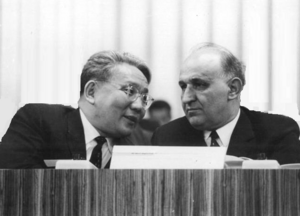Soptenese Crisis of Succession
| Soptenese Crisis of Succession | |||||||
|---|---|---|---|---|---|---|---|
 Srảs Buklonoz meets with the ambassador of X | |||||||
| |||||||
| Belligerents | |||||||
| Soptenese Advisory Council | Various | ||||||
| Commanders and leaders | |||||||
| Srảs Buklonoz | |||||||
The Soptenese Crisis of Succession was a series of events that transpired in 1950-52 following the death of King and Minister to the Nation Fydogaq Ẹadaz, and resulted in the reforming of Soptemia into a Constitutional Monarchy.
Events
On September 7th 1950, the Fydogaq Ẹadaz died from a stroke without heir. This launched Soptemia into the Soptenese Crisis of Succession which lasted until 1952. The following morning, Minister of foreign affairs, Srảs Buklonoz publicly stated that Ẹadaz’s advisory council (of which he was the most powerful member), would be holding the government over until the elect of high clergy could meet and select a new king and minister to the nation. Things remained relatively under control until the 24th of September, when a rumor surfaced that Minister to education, Botokoh Vimys was colluding with Buklonoz to embezzle funds. This sparked some protests, but no violence.
That changed when on the 2nd of October, an attempted coup took place. Buklonoz then placed the nation into a state of emergency, something that had not happened since the great flood of 1931. The elect of high clergy released a statement that argued that Buklonoz was unfit to be interim ruler, and blamed him for preventing them from naming a new king. Around October 12th, Ṉowohl Ganohn, One of the elect that authored that statement disappeared under suspicious circumstances. This caused even more protests and a joint letter from five counties that Buklonoz should resign immediately, and if he doesn’t, then the elect has the power to force him to.
On January 3rd, 1951, Thermiss became the first county to declare independence, followed by Cada and Cvadon on January 7th. On January 15th, Cada sent a letter to the Embassy of X asking to be annexed by them. On January 17th, Buklonoz took a trip to X requesting that they not intervene. On January 21st, The advisory council stated that the state of emergency would end as soon as the perpetrators of the attempted coup had been caught. On February 9th, Thermis, Cada and Cvadon relented. On June 16th, the perpetrator of the attempted coup was arrested and charged. On June 19th, the elect of high clergy requested the state of emergency be lifted. On June 23rd, the state of emergency was lifted.
The elect of high clergy finally met on August 7th, nearly a full year after Ẹadaz’s death. On August 12th, they stated that Buklonoz was at fault for the disappearance of Ṉowohl Ganohn. On August 13th, the elect was disbanded by the advisory council, and stated that the clerical status of several of the elect was thereby revoked. On the same day, four of the elect disappeared. Unrest followed, and on August 22nd, another attempted coup took place, this one was even less successful than the last. Soptemia was again placed under a state of emergency. On September 4th, the four elect that went missing in August turned up, having defected to X. They stated that Buklonoz and the advisory council had attempted to bribe some of the elect and place their own members on the elect.
Immediately following that, Riots erupted across Soptemia. Over the next six successive nights, over 120 Million Vosoms worth of property damage was caused, and 16 people died, including 5 at the hands of the police. This became known as the week of first blood. Between September 9th, and September 18th, six counties and three provinces declared independence, and a pro-independence coup occurred in X, on October 3rd, temporarily deposing the count and parliament. Relative law and order was restored by October 12th, when the army came and performed a counter-coup in X, and the advisory council retracted their statements about revoking clerical status, and invited the four defects to return, although none did.
On December 31st, Minister to the protection of the law, Syrỉs Vigaz, defected to X, and released a statement revealing that Buklonoz requested to have the four defecting elect extradited, were planning on having some of the dissenting county and provincial governments arrested, and were planning on fixing the selection of the next king and minister to the nation to one of Buklonoz’s friends. Vigaz also stated that all the rumors of corruption and embezzlement were true, and that the person that was arrested for the first coup was likely not the perpetrator.

Riots erupted again, and even more violently. Buklonoz’s house was burnt down on the night of January 2nd, 1952, and on January 5th, mass arrests began. On January 11th, another county and two more provinces declared independence. The riots lasted through January 24th, when X made an ultimatum, stating that if Buklonoz did not resign immediately, they would intervene. On January 26th, Buklonoz, along with the rest of the advisory council, resigned, bringing an end to the riots. On February 1st, the elect of high clergy finally met in Obe Anstemen, not only to select a new minister to the nation, but to prevent this sort of thing from ever happening again.
What they came up with, on February 24th, was The Reform, a series of changes that affected not only government, but was to modernize all walks of life in Soptemia, as well as eliminating the title of king, and making the Minister to the Nation a non-hereditary position. Bụḉỷntụsi Kẹnỏ, a young priest, was selected as Minister to the Nation. Soptemia became a democracy for the first time, as a parliament was added. An addendum to this was added to this in March of 1958, clarifying the details and resolving small conflicts and loopholes that existed in the original. These two documents now make up the constitution of Soptemia.